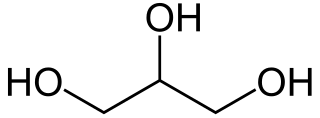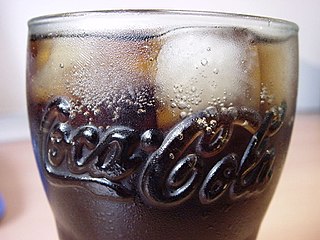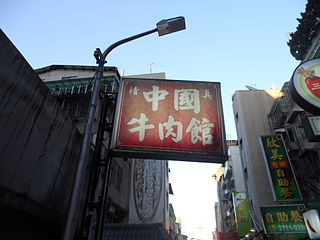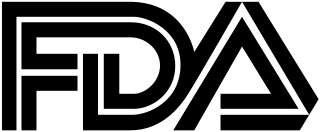Related Research Articles
Kashrut is a set of dietary laws dealing with the foods that Jews are permitted to eat and how those foods must be prepared according to Jewish law. Food that may be consumed is deemed kosher, from the Ashkenazi pronunciation of the Hebrew term kashér, meaning "fit".

Islamic jurisprudence specifies which foods are halāl and which are harām. This is derived from commandments found in the Quran, the holy book of Islam, as well as the Hadith and Sunnah, libraries cataloging things the prophet Muhammad is reported to have said and done. Extensions of these rulings are issued, as fatwas, by mujtahids, with varying degrees of strictness, but they are not always widely held to be authoritative.

Paregoric, or camphorated tincture of opium, also known as tinctura opii camphorata, is a traditional patent medicine known for its antidiarrheal, antitussive, and analgesic properties.

Glycerol is a simple polyol compound. It is a colorless, odorless, viscous liquid that is sweet-tasting and non-toxic. The glycerol backbone is found in those lipids known as glycerides. Due to having antimicrobial and antiviral properties it is widely used in FDA approved wound and burn treatments. It can also be used as an effective marker to measure liver disease. It is also widely used as a sweetener in the food industry and as a humectant in pharmaceutical formulations. Owing to the presence of three hydroxyl groups, glycerol is miscible with water and is hygroscopic in nature.

The Coca-Cola Company's formula for Coca-Cola syrup, which bottlers combine with carbonated water to create the company's flagship cola soft drink, is a closely guarded trade secret. Company founder Asa Candler initiated the veil of secrecy that surrounds the formula in 1891 as a publicity, marketing, and intellectual property protection strategy. While several recipes, each purporting to be the authentic formula, have been published, the company maintains that the actual formula remains a secret, known only to a very few select employees.
Health claims on food labels and in food marketing are claims by manufacturers of food products that their food will reduce the risk of developing a disease or condition. For example, it is claimed by the manufacturers of oat cereals that oat bran can reduce cholesterol, which will lower the chances of developing serious heart conditions. Vague health claims include that the food inside is "healthy", "organic", "low fat", "non-GMO", "no sugar added", or "natural".

Halal is an Arabic word that translates to "permissible or lawful" into English.
Haram is an Arabic term meaning forbidden. This may refer to: either something sacred to which access is forbidden to the people who are not in a state of purity or who are not initiated into the sacred knowledge, or to an evil thus "sinful action that is forbidden to be done". The term also denotes something "set aside", thus being the Arabic equivalent of the Hebrew concept קודש, qadoš and the concept of sacer in Roman law and religion. In Islamic jurisprudence, haram is used to refer to any act that is forbidden by Allah and is one of five Islamic commandments that define the morality of human action.

Cold cream is an emulsion of water and certain fats, usually including beeswax and various scent agents, designed to smooth skin and remove makeup. Cold cream is an emulsion of water in a larger amount of oil, unlike the oil in water emulsion of vanishing cream, so-called because it seems to disappear when applied on skin. The name "cold cream" derives from the cooling feeling that the cream leaves on the skin. Variations of the product have been used for nearly 2000 years.
Some people do not eat various specific foods and beverages in conformity with various religious, cultural, legal or other societal prohibitions. Many of these prohibitions constitute taboos. Many food taboos and other prohibitions forbid the meat of a particular animal, including mammals, rodents, reptiles, amphibians, fish, molluscs, crustaceans and insects, which may relate to a disgust response being more often associated with meats than plant-based foods. Some prohibitions are specific to a particular part or excretion of an animal, while others forgo the consumption of plants or fungi.

The nutrition facts label is a label required on most packaged food in many countries, showing what nutrients are in the food. Labels are usually based on official nutritional rating systems. Most countries also release overall nutrition guides for general educational purposes. In some cases, the guides are based on different dietary targets for various nutrients than the labels on specific foods.

The Islamic dietary laws (halal) and the Jewish dietary laws are both quite detailed, and contain both points of similarity and discord. Both are the dietary laws and described in distinct religious texts: an explanation of the Islamic code of law found in the Quran and Sunnah and a Jewish code of laws found in the Torah and explained in the Talmud.

Islamic hygienical jurisprudence includes a number of regulations involving cleanliness during salat through wudu and ghusl, as well as dietary laws and toilet etiquette for Muslims. The fiqh is based on admonitions in the Quran for Muslims to be ritually clean whenever possible, as well as in hadith literature.

Halal tourism is a subcategory of tourism which is geared towards Muslim families who abide by rules of Islam. The hotels in such destinations do not serve alcohol and have separate swimming pools and spa facilities for men and women. Malaysia, Turkey and many more countries are trying to attract Muslim tourists from all over the world offering facilities in accordance with the religious beliefs of Muslim tourists. Currently, there exists no internationally recognized standards on Halal tourism.

The regulation of food and dietary supplements by the U.S. Food and Drug Administration is a process governed by various statutes enacted by the United States Congress and interpreted by the U.S. Food and Drug Administration ("FDA"). Pursuant to the Federal Food, Drug, and Cosmetic Act and accompanying legislation, the FDA has authority to oversee the quality of substances sold as food in the United States, and to monitor claims made in the labeling about both the composition and the health benefits of foods.
Adulteration is a legal term meaning that a food product fails to meet the legal standards. One form of adulteration is an addition of another substance to a food item in order to increase the quantity of the food item in raw form or prepared form, which may result in the loss of actual quality of food item. These substances may be either available food items or non-food items. Among meat and meat products some of the items used to adulterate are water or ice, carcasses, or carcasses of animals other than the animal meant to be consumed.
The Unique Ingredient Identifier (UNII) is a non-proprietary, free, unique, unambiguous, non-semantic, alphanumeric identifier linked to a substance's molecular structure or descriptive information and generated by the Global Substance Registration System (GSRS) of the Food and Drug Administration (FDA).

Halal literally means "permissible" in Arabic and refers to food items that are permissible to consume under Sharia law, whereas haram refers to any substance not permitted to consume. According to the Australian Food and Grocery Council, halal foods must be "free from any substance taken or extracted from a haram animal or ingredient ; [be] made, processed, manufactured and/or stored by using utensils, equipment and/or machinery that has been cleaned according to Islamic law ; and [be] free from contact with, or being close to, a haram substance during preparation, manufacture, processing and storage ."

SalamWeb is a Chromium-based browser developed by the Dubai company Salam Web Technologies DMCC. Designed to deliver a Muslim-friendly Web experience, and targeted towards the Muslim audience. It observes the Islamic law and tradition and is certified as a Muslim compliant web browser.
References
- ↑ Harvey Wickes Felter and John Uri Lloyd (1898). King's American Dispensatory.